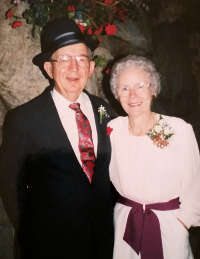
NEWS! The Josephine & Winfred Brendle Schoilarship Fund
Determined by IRS To Be Public Charity
The U. S. Department of Treasurery (IRS-EO) has determined that the Josephine & Winfred Brendle Scholarship Fund is a Section 501(c)(3) tax exempt, public charity. The determination was issued on December 31, 2014. Donors can therefore make deductible contributions under Internal Revenue Code (IRC) Section 170. The fund is also qualified to receive tax deductible bequests, devises, transfers or gifts under Section 2055, 2106, or 2522. For those who have already contributed, it is important to note that the effective date of the exemption is October 25, 2014.
The bylaws of the corporation further define the fund's purpose in terms of financial aid to students. The bylaw language is as follows:
"The purpose of The Josephine & Winfred Brendle Scholarship Fund is to provide scholarships and/or scholastic no-interest loans to financially challenged students, particularly of Appalachia or Haiti. Any repaid loans shall be returned to the fund in order to assist other students. This purpose shall at all times be exclusively for charitable, religious, educational and scientific purposes, including, for such purposes, the making of distributions to organizations that qualify as exempt organizations under Section 501(c)(3) of the Internal Revenue Code, or the corresponding section of any future federal tax code."
The fund may be contacted by email at This email address is being protected from spambots. You need JavaScript enabled to view it..
You may donate by clicking on the button below:
(Click on
image
to see
Letter)
The Josephine & Winfred Brendle Scholarship Fund
This fund was organized as a Virginia non-profit, non-stock corporation on October 25, 2014. Begun to provide financial assistance to some of the poorest students in the world, particularly those residing in the Appalachian regions of the United States and those residing in Haiti, the fund was named by its founding directors in memory of their parents, Josephine Martin Brendle and David Winfred "Winnie" Brendle.
 Josephine and Winfred Brendle were both educators. Josephine came from the Appalachian mountains and was the daughter of a Baptist preacher. She was one of 14 children, seven of whom lived to adulthood. Her father, Jeff Martin, died young leaving his wife with little to support the family. Ila Martin and the children were well acquainted with poverty. In spite of her circumstances, Josephine, or "Jo" made her way through high school and studied at Berry and Montreat Colleges. In 1940 she left school to marry "Winnie" Brendle, a resident of Burke County, North Carolina. In the years that followed she gave birth to three sons, Jeffrey, Timothy and Thaddeaus. She worked as a homemaker until her youngest son was almost ready for school. She then enrolled in Lenoir-Rhyne College in Hickory, North Carolina and completed her Bachelor of Arts degree. After graduating, she began teaching at North Carolina School for the Deaf where she taught for more than 30 years until her retirement. She was a beloved teacher, valued colleague and exemplary Christian woman.
Josephine and Winfred Brendle were both educators. Josephine came from the Appalachian mountains and was the daughter of a Baptist preacher. She was one of 14 children, seven of whom lived to adulthood. Her father, Jeff Martin, died young leaving his wife with little to support the family. Ila Martin and the children were well acquainted with poverty. In spite of her circumstances, Josephine, or "Jo" made her way through high school and studied at Berry and Montreat Colleges. In 1940 she left school to marry "Winnie" Brendle, a resident of Burke County, North Carolina. In the years that followed she gave birth to three sons, Jeffrey, Timothy and Thaddeaus. She worked as a homemaker until her youngest son was almost ready for school. She then enrolled in Lenoir-Rhyne College in Hickory, North Carolina and completed her Bachelor of Arts degree. After graduating, she began teaching at North Carolina School for the Deaf where she taught for more than 30 years until her retirement. She was a beloved teacher, valued colleague and exemplary Christian woman.
Winfred Brendle was forced to join the work force to help support his family after only eight years of school. He spent most of his life working as a "fixer" of hosiery knitting machines in Drexel, North Carolina. He continued his education independently by reading continuously, focusing mostly on Biblical studies. A member of Drexel First Baptist Church, he taught boys and young men the Word of God. He was a deeply committed Christian and served for many years as a deacon. In the home, he taught his children Christian values and led the family in daily prayer and Bible study. He had a deep compassion for "lost people" (those who had not accepted Jesus Christ as their Lord and Savior) and frequently shared the gospel with coworkers and friends. For many years he taught Sunday School to adult men at First Baptist and his class included a doctor, a lawyer, and an educator with a Doctor of Philosophy degree. He was loved as a teacher and often cited as a teacher who could make the Bible come alive. His life illustrated the truth that education is not limited to formal institutions.
Page 2 of 2



